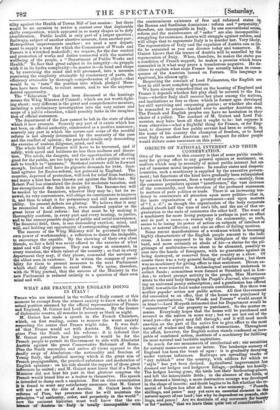WHAT ARE FRANCE AND ENGLAND DOING IN ITALY?
moot who are interested in the welfare of Italy cannot at this moment be exempt from the utmost anxiety to know what is the aetual position assumed by the official representatives of France and England, M. Guizot and Lord Palmerston. By the licence of diplomatic reserve, all remains in secrecy as black as night. M. Guizot has made a speech in the French Chambers, which, on first reading, seems to remove the worst anxiety respecting the course that France might take. It was fear- ed that France would act with Austria. M. Guizot eulo- gizes Pius the Ninth and his reforms : it is inferred that M. Guizot perceives how impossible it would be for the French people to permit its Government to side with Absolutist Austria against the great Conservative Reformer of Rome. Pius the Ninth reconciles and unites all views opposed to the deadly sway of Absolutism—the nationality and freedom of Young Italy, the political moving which is the great aim of French propagandism, the practical substance and moderation of English opinions : on his side should the support of those great influences be united ; and M. Guizot must know that if a French Minister did not bear his part in that glorious congress the French would brand him as a traitor to themselves. His speech is intended to damp such a suspicion. But on close examination it is found to want any satisfactory assurance that M. Guizot will not act on the side of Austria. M. Guizot lauds the reforms of Pius, but presumes that he will maintain the phiciples "of. authority, order, and perpetuity in the world " : now the eminent historian must well know that the ex- istence of Austria in ItalY is totally incompatible with the conterminous existence of free and reformed states in the Roman and Sardinian dominions : reform and "perpetuity," therefore, are incompatible in Italy. In one conventional sense, reform and the maintenance of " order " are also incompatible : struggling for existence, Austria will struggle against reform, and will allege that to regenerate Italy is to murder her. Very likely. The regeneration of Italy and the expulsion of Austria can as lit- tle be separated as you can divorce today and tomorrow. M. Guizot knows that the tenure of Austria will be annulled by the regeneration of Italy. When, therefore, he makes the status quo a condition of French support, he makes a promise which bears concealed in it what may prove a treacherous negative. He de- clines to explain what steps France has actually taken in conse- quence of the Austrian inroad on Ferrara. His language is
0 0
equivocal, his silence ugly.
Respecting the conduct of Lord Palmerston, the English are kept in still more complete ignorance.
We have already remarked that on the bearing of England and France it depends whether fair play- shall be secured to the Ita- lians—whether Italy shall recover her place among the nations, and institutions as free as those which in former ages developed her still surviving and surpassing genius ; or whether she shall be remanded to prison—handed over to another Austrian sera. The French and English peoples can have no hesitation in their choice of a policy. The conduct of M. Guizot and Lord Pal- merston may have been all that it ought to be: but suppose it were otherwise—what a frightful thing for France, or for Eng- land, to discover that her public servant had been so acting, in the name of his country the champion of freedom, as to hand over Italy to another Austrian aira! Respect for either people would dictate some assurance on this point.


























 Previous page
Previous page